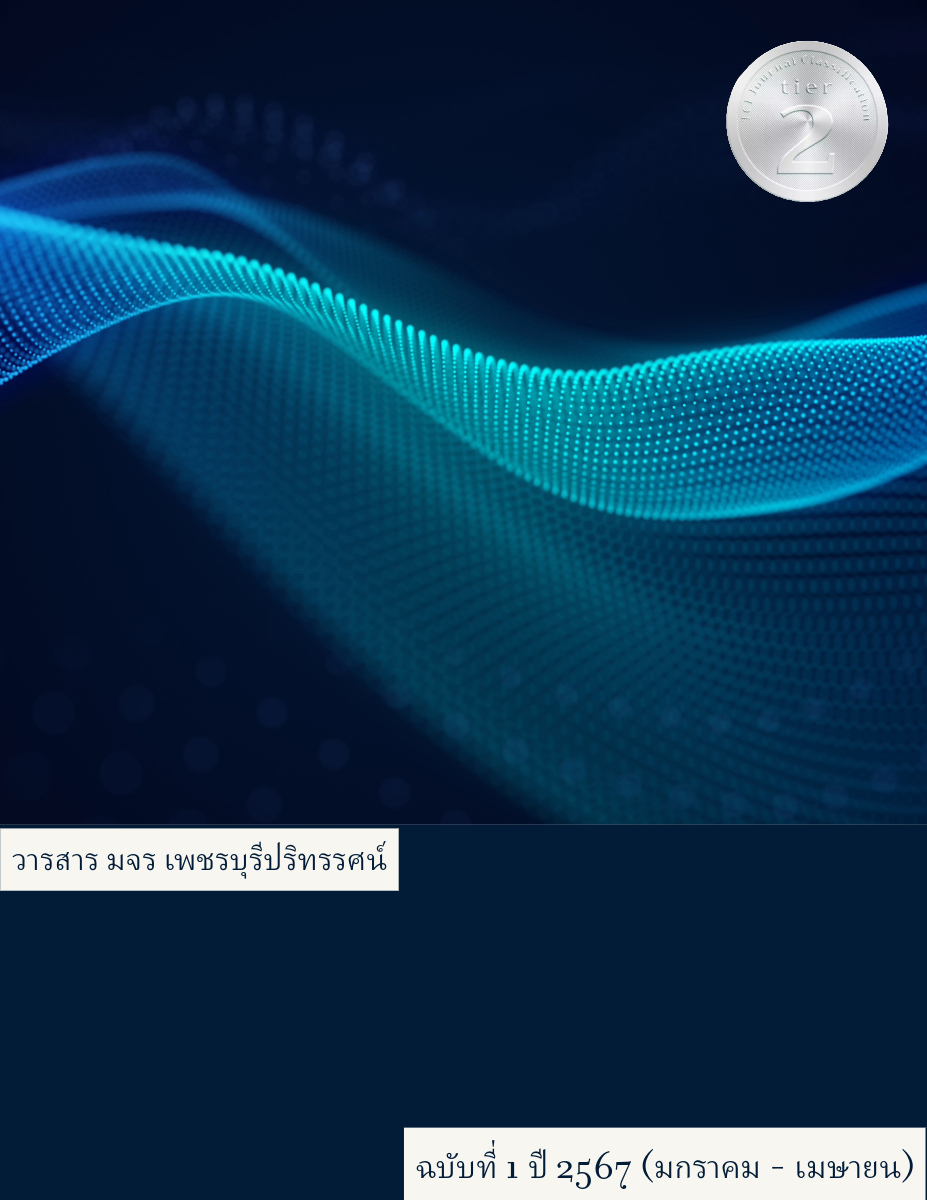Self-Protection Behavior from Coronavirus Disease 2019 of People in Tourist Area in Chiang Mai Province
Main Article Content
Abstract
The Research on preventive behavior from the coronavirus of people in tourist attraction areas in Mueang District Chiang Mai Province The objective is to study self-protection behavior. and compare behaviors to protect against the coronavirus, classified by gender, age, and occupation. The population is people in tourist attraction areas in Mueang District. Chiang Mai Province The sample group is store operators. and tourists in the area Calculated from the formula for finding a sample without knowing the population size. The sample size was 384 people. The research instrument was a self-protective behavior questionnaire. which the researcher has developed It has been checked for content validity through experts. and the confidence value with Cronbach's alpha coefficient is equal to 0.97. Data collection and analyze data using descriptive statistics
The results showed that the majority of the sample were male, less than 20 years old, bachelor's degree level, single status, current occupation as a student. Current income/month is less than 15,000 baht. Sources of information about the COVID-19 situation from Social Media (Facebook and Twitter). As for knowledge about protecting yourself from coronavirus infection, it was found that the first 3 The incubation period for the coronavirus is the time period after exposure or exposure to the virus until symptoms begin. It is a disease that can be easily transmitted. and wearing a mask/cloth Can help prevent infection with the coronavirus. As for behavior to prevent disease caused by the coronavirus Overall, it is at a high level. The first 3 items are: You wear a mask/cloth. When leaving home , when you go to crowded places such as flea markets, malls, you follow the rules of the place and you check your temperature. At the screening point , when comparing opinions on coronavirus prevention behaviors of different genders, ages, and occupations, it was found that there were significant differences. Statistically significant at the 0.01 level.
Keywords: Self-Protection Behavior from Coronavirus Disease 2019, Knowledge about Self-Protection from Coronavirus Infection
Article Details

This work is licensed under a Creative Commons Attribution-NonCommercial-NoDerivatives 4.0 International License.
References
กรมควบคุมโรค กระทรวงสาธารณสุข. (2563). โรคติดเชื้อไวรัสโคโรนา 2019 (COVID-19). เรียกใช้เมื่อ 27 สิงหาคม 2564 จาก https://ddc.moph.go.th/viralpneumonia /faq_more.php.
ขวัญตา สุธรรม. (2561). การป้องกันตนเองจากควันบุหรี่มือสองของนักเรียน มัธยมศึกษาตอนต้น จังหวัดราชบุรี. ใน (วิทยานิพนธ์สาธารณสุขศาสตรมหาบัณฑิต สาขาวิชาการจัดการการสร้างเสริมสุขภาพ). บัณฑิตวิทยาลัย มหาวิทยาลัยธรรมศาสตร์.
จันทิมา ห้าวหาญ และพรรณวดี ขาจริง. (2563). ความรู้ความเข้าใจและพฤติกรรมการปฏิบัติตนเกี่ยวกับการป้องกันโรคโควิด-19 (COVID-19) ของประชาชนในจังหวัดภูเก็ต. การประชุมวิชาการระดับชาติครั้งที่ 11 ปีการศึกษา 2563 หัวข้อ “Community-led Social Innovation in the Era of Global Changes amidst Covid-19 Crisis: นวัตกรรมทางสังคมของชุมชนในยุคของการเปลี่ยนแปลงโลกท่ามกลางวิกฤตโควิด-19” 19 กุมภาพันธ์ 2564 (หน้า 169-178). ภูเก็ต: วิทยาลัยเทคโนโลยีภาคใต้.
จารุรัตน์ ศรีรัตนประภาส และจิราวรรณ กล่อมเมฆ. (2565). ความรู้ ทัศนคติ และพฤติกรรมการป้องกันโควิด-19 ของประชากร วัยทำงานในตำบลมวกเหล็ก อำเภอมวกเหล็ก จังหวัดสระบุรี. วารสารพยาบาลทหารบก, 23(1), 437-445.
จารุวรรณ แหลมไธสง และคณะ. (2562). ปัจจัยทำนายพฤติกรรมการป้องกันการติดเชื้อทางเดินหายใจของผู้ดูแลเด็กปฐมวัยในศูนย์เด็กเล็ก กรุงเทพมหานคร. วารสารพยาบาลสาธารณสุข, 33(1), 1-19.
จิราพร บาริศรี และคณะ. (2563). พฤติกรรมการปองกันโรคโควิด-2019 (COVID -2019) ของนักศึกษามหาวิทยาลัยราชภัฏรอยเอ็ด. วารสารการบริหารนิติบุคคลและนวัตกรรมท้องถิ่น, 6(6), 38-45.
ธานี กล่อมใจ และคณะ. (2563). ความรู้และพฤติกรรมของประชาชนเรื่องการป้องกันตนเองจากการติดเชื้อไวรัสโคโรนา สายพันธุ์ใหม่ 2019. วารสารการพยาบาล การสาธารณสุข และการศึกษา, 21(2), 29-39.
นารีมะห์ แวปูเตะ และคณะ. (2564). พฤติกรรมการป้องกันโรคจากไวรัสโคโรนา 2019 ของนักศึกษา มหาวิทยาลัยราชภัฏสงขลา. วารสารสภาการสาธารณสุขชุมชน, 3 (2), 31-39.
ภัคณัฐ วีรขจร และคณะ. (2563). การรับรู้และพฤติกรรมการป้องกันโรคติดเชื้อไวรัสโคโรนา 2019 (covid19) ของกำลังพลที่ปฏิบัติงานสายแพทย์ ศูนย์อำนวยการแพทย์ จังหวัดชายแดนภาคใต้. วารสารสาธารณสุขและวิทยาศาสตร์สุขภาพ, 3(3), 106-117.
รังสรรค์โฉมยา และกรรณิกา พันธ์ศร. (2563). ความตระหนักเกี่ยวกับพฤติกรรมการป้องกันการติดต่อโรคไวรัสโคโรนาสาย พันธุ์ใหม่ (โควิด-19): การเปรียบเทียบระหว่างวัย. วารสารมนุษยศาสตร์และสังคมศาสตร์ มหาวิทยาลัยมหาสารคาม, 39(6), 71-82.
สุภาภรณ์ วงธิ. (2564). ปัจจัยที่ส่งผลต่อพฤติกรรมการป้องกันโรคติดเชื้อไวรัสโคโรนา 2019 ของอาสาสมัครสาธารณสุขประจำหมู่บ้าน จังหวัดสุโขทัย. ใน (วิทยานิพนธ์หลักสูตรสาธารณสุขศาสตรมหาบัณฑิต สาขาวิชาสาธารณสุข). บัณฑิตวิทยาลัย มหาวิทยาลัยนเรศวร.
Atchison, C. J., et al. (2020). Perceptions and behavioral responses of the general public during the covid-19 pandemic: A cross-sectional survey of uk adults. London: Imperial College London.
Taghrir, M. H., et al. (2020). Covid-19and iranian medical students; asurvey on their related-knowledge, preventive behaviors and risk perception. Archives of Iranian medicine, 23(4), 249-254.


